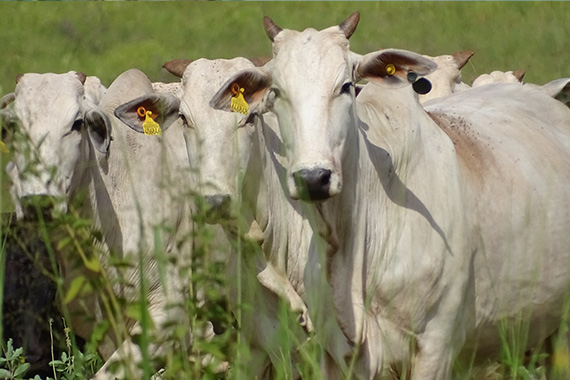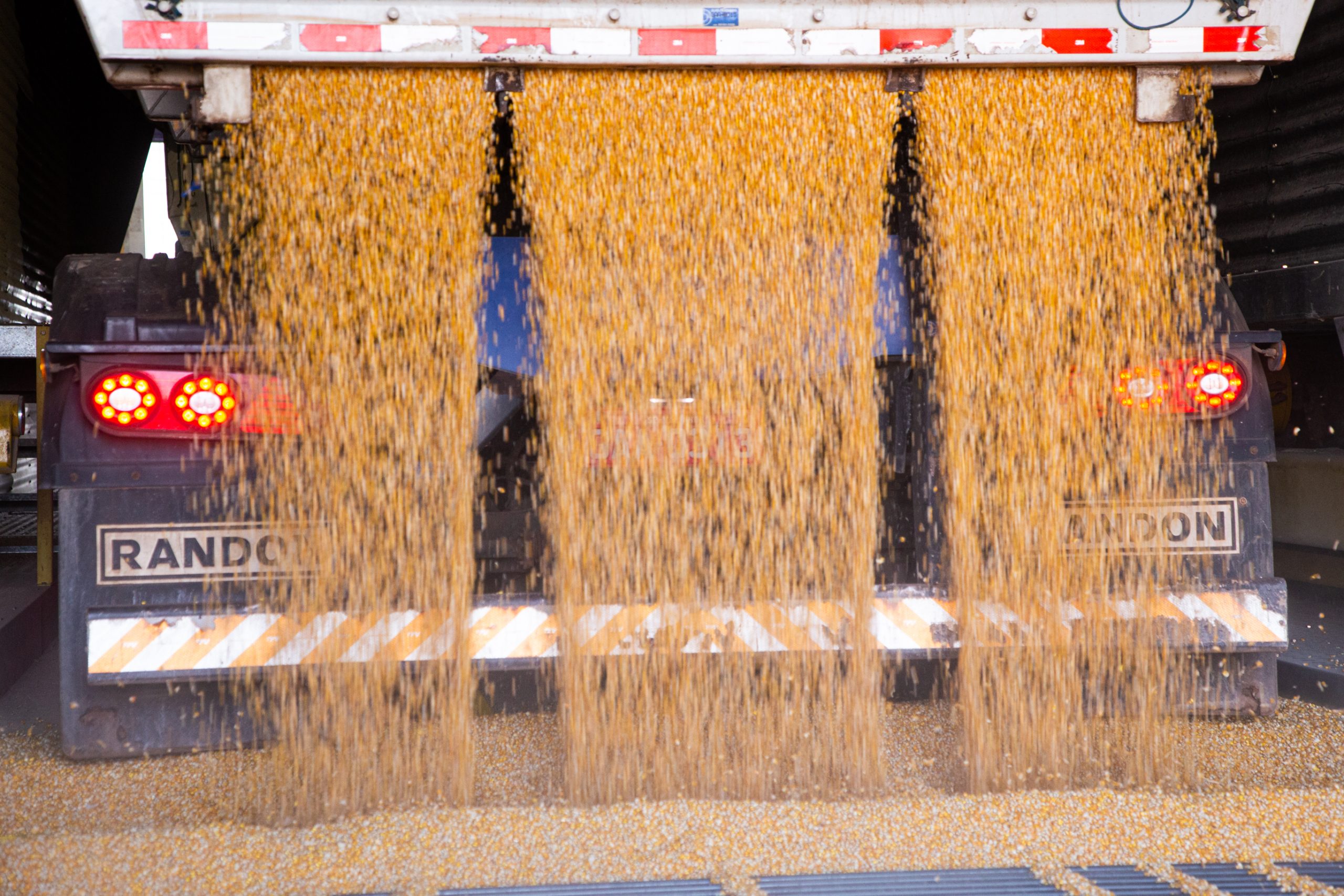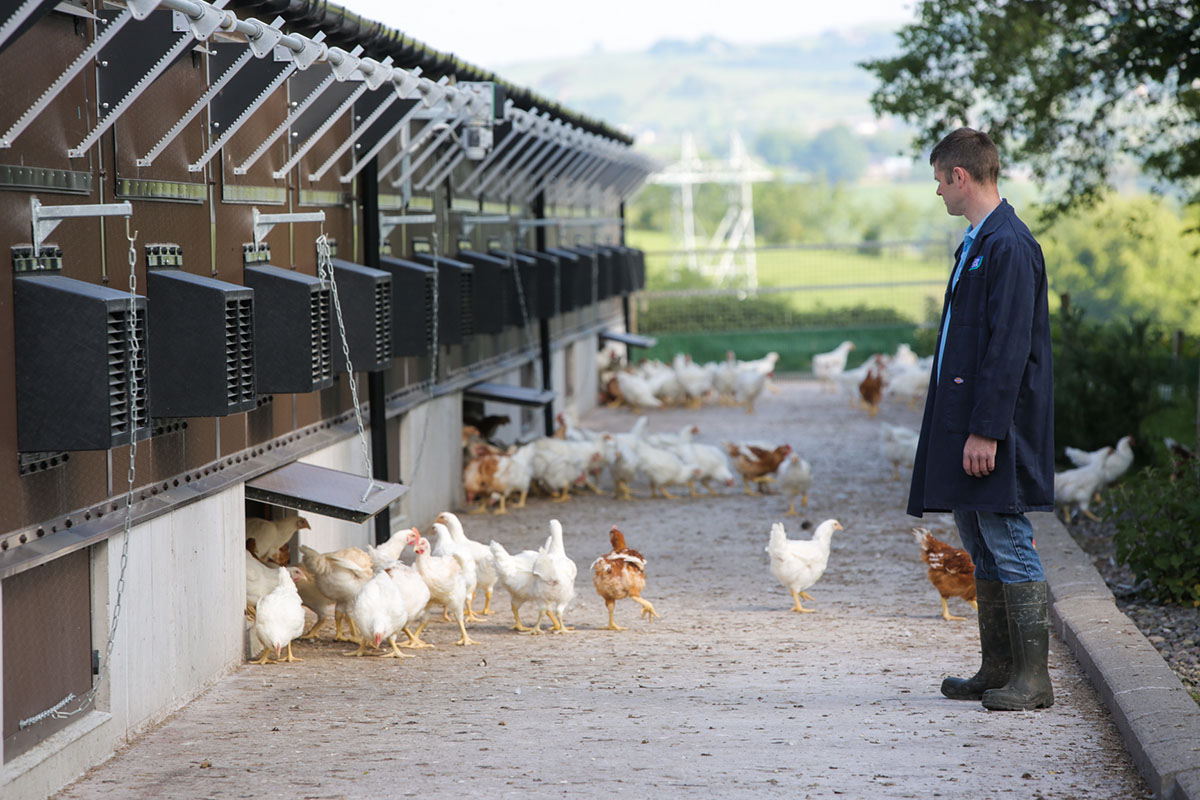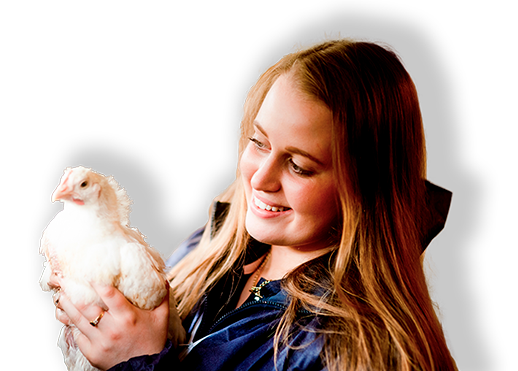Health and Nutrition
Assessing the daily needs and health status of the animals under our direct care is essential to maintaining their well-being. Our approach is centered on regular, proactive evaluation, which includes frequent health checks, close collaboration with veterinarians, and training for farm staff to identify early signs of illness or discomfort. We consistently evaluate and address health challenges in our live operations, making sure our animals receive the care they need throughout their lives.


Monitoring Animal Health
Our Regional Approaches:
Australia:
Cattle: Upon arrival at our Australian feedlots, cattle are immediately assessed for health and nutrition status, provided individual identification tags, and vaccinated. Experienced pen...
Australia:
Cattle: Upon arrival at our Australian feedlots, cattle are immediately assessed for health and nutrition status, provided individual identification tags, and vaccinated. Experienced pen riders monitor cattle daily for signs of injury or illness, and animals requiring additional care are moved to a hospital area for treatment under the guidance of veterinarians and animal health technicians.
Hogs: Rivalea’s farming operations follow a structured animal health program, developed with company veterinarians and aligned with the APIQ Standards for Animal Welfare (Module 3) and Biosecurity (Module 4). The program includes regular veterinary consultations, focused management programs, and biosecurity protocols. Rivalea team members are trained to recognize early signs of illness and provide appropriate care under veterinary supervision.
Salmon: Huon fish populations are monitored in real time . On-site cameras provide live insights into fish health, condition, and feed response. Targeted checks supplement these assessments, offering a comprehensive view of each population’s health and welfare. Animal welfare metrics are tracked at every handling event and reviewed through daily reports, weekly meetings, internal audits, and end-of-period performance evaluations. Huon actively participates in the Tasmanian Salmonid Health Surveillance Program (TSHSP), a collaborative initiative between the Tasmanian Department of Primary Industries, Parks, Water, and Environment (DPIPWE) and the salmonid industry. This program plays a critical role in maintaining Tasmania's biosecurity status and maintaining the health of farmed salmon.
Brazil:
Cattle: At JBS-owned feedlots, animal health is treated as a priority and is systematically monitored by trained and experienced teams. All employees who ...
Brazil:
Cattle: At JBS-owned feedlots, animal health is treated as a priority and is systematically monitored by trained and experienced teams. All employees who work directly or indirectly with animals receive periodic training on good handling practices according to their roles. These training sessions are organized in partnership with the Corporate Animal Welfare team, promoting all units’ adherence to the same standards required by JBS and Ethology guidelines. In addition, we rely on the support of a specialized animal health consultant that assists with continuously updating protocols, aligning them with the latest scientific research and innovations. Cattle undergo daily inspections carried out by trained technicians, focusing on behavior, feed intake, welfare, and sanitary conditions. When necessary, animals are moved to observation pens and receive individualized care, with technical follow-up and, when indicated, veterinary treatment. Medication use is strictly controlled, with all treatments recorded in our traceability system and concluded prior to processing, maintaining compliance with the withdrawal periods for each substance.
Hogs and Chickens: At Seara, chicken flocks and swine herds are regularly monitored, and training is provided to team members and farm partners on best-practice guidelines and procedures for animal nutrition and health. Additionally, veterinary oversight is provided to all operations.
Europe:
Hogs: Pilgrim’s Europe makes sure that farmers within our higher welfare hog supply chain thoroughly understand the program’s requirements for animal...
Europe:
Hogs: Pilgrim’s Europe makes sure that farmers within our higher welfare hog supply chain thoroughly understand the program’s requirements for animal health and nutrition. Our experienced field staff and veterinarians support family farm partners with regular site visits, trainings on animal husbandry, welfare, and health, and quarterly update meetings.
Chickens: Pilgrim’s Europe field teams conduct chicken flock monitoring at least once—but typically two to three times—during each flock cycle as part of our comprehensive animal welfare audit program. These visits allow close collaboration with farmers to detect early signs of potential issues, and, when necessary, implement corrective actions such as adjusting ventilation or water systems in alignment with best practices.
Mexico:
To help assure the proper management and monitoring of bird health in long-cycle poultry and broiler farms, our Pilgrim’s...
Mexico:
Chickens: To help assure the proper management and monitoring of bird health in long-cycle poultry and broiler farms, our Pilgrim’s Mexico team utilizes a variety of practices, including daily inspections, continuous vaccination and preventative medicine programs, and more. Flocks are inspected at least twice a day to confirm if conditions such as bird health and mobility, feed and water levels, and facility safety, lighting, temperature, humidity, ventilation, air quality, and stocking density meet Pilgrim’s Mexico standards.
United States:
Cattle: The cattle that supply our U.S. beef processing facilities are purchased on the open market, and as assurance of these animals, JBS requires...
United States:
Cattle: The cattle that supply our U.S. beef processing facilities are purchased on the open market, and as assurance of these animals, JBS requires all livestock suppliers to comply with FDA and/or USDA regulations for use of all animal drugs and products. This requires each supplier to attest in writing that they have complied with the governing regulations; that only approved FDA and/or USDA pharmaceutical compounds are used as labeled or under veterinary direction; the recommended withdrawal times on the label are met before slaughter; and they are in compliance with all state or national BQA certification and verification programs.
Hogs: In the U.S., our live pork operation staff and contract sow and finishing partners monitor hog health daily. Production field managers and veterinarians visit farms regularly and are available 24 hours a day, seven days a week to support our contract partners in maintaining hog health. Field managers also inspect pig health and nutrition to verify that our programs are properly implemented, and animals remain in optimal condition.
Chickens: Pilgrim’s poultry farmer partners are required to inspect their chicken houses and flocks at least twice per day, monitoring for health conditions such as eye health and lameness. Chickens that are severely ill or injured and unlikely to recover are humanely euthanized using methods approved by the American Veterinary Medical Association or equivalent standards, such as cervical dislocation. To maintain flock health, Pilgrim’s technicians visit poultry farms regularly and are available 24 hours a day, seven days a week. During these visits, they inspect both the farm and the chickens to verify that the farm’s health plan is being followed. They evaluate health indicators such as eye and leg health, mortality rates, rodent and pest control, ammonia levels, litter conditions, and feed and water supply. Our technicians also share best practices for raising healthier chickens.
Veterinary Care
Across our live animal operations and those of our contracted farmer partners, licensed veterinarians establish and monitor animal health and vaccine protocols in accordance with government regulations. They perform routine health checks and are available for consultation as needed. Each operation maintains a written health plan developed with input from our veterinarians. These plans include protocols for animal management, vaccination schedules, health monitoring and treatment, mortality and morbidity tracking, and disease transmission prevention. Our veterinarians also work to mitigate or eliminate animal pain wherever possible.
Physical Alterations
Our Regional Approaches
Australia:
Cattle: At our Australian feedlots, we prioritize sourcing cattle that have been pre-conditioned prior to arrival, including early-life procedures such as castration, disbudding...
Australia:
Cattle: At our Australian feedlots, we prioritize sourcing cattle that have been pre-conditioned prior to arrival, including early-life procedures such as castration, disbudding (if necessary), vaccination, and weaning. Castration and spaying are not performed at JBS Australia feedlots, and dehorning follows the guidelines laid out in the Australian Animal Welfare Standards – Cattle.
Hogs: Our Australian pig farming operations do not permit teeth clipping, surgical castration or ear notching, on any of its pigs and does not use nose rings on sows. Tail docking is performed within 3 days of birth to reduce the risk of tail biting, which can reduce animal health and increase risk of infection. The tail docking process is conducted using innovative methods based on collaborative research on site.
Salmon: At Huon, no commercial fish populations undergo physical alterations. In research and development (R&D) trials, adipose fin clipping may be used for identification purposes, with trial specific animal ethics approval, but only on anesthetized fish and with protocols in place to prevent infection.
Brazil:
Cattle: In Brazilian cattle farming, including JBS feedlots, the predominant breeds are naturally polled animals. In cases where an animal is not polled, producers...
Brazil:
Cattle: In Brazilian cattle farming, including JBS feedlots, the predominant breeds are naturally polled animals. In cases where an animal is not polled, producers generally do not perform dehorning or tail docking, unless in specific situations involving disease or injury and only under veterinary recommendation. In addition, less than 3% of the cattle processed by Friboi in 2024 were castrated, demonstrating our dedication to reducing physical alterations among our suppliers.
Hogs and Chickens: In our Seara operations, procedures that cause pain or discomfort are discouraged. Surgical castration and teeth clipping are prohibited in all pigs, and 100% immunocastration technology is used instead. Beak trimming is also not allowed on any of our broiler chickens.
Europe:
Hogs: Pilgrim's Europe does not permit routine tail docking or castration on its pigs. Our current research includes a project examining...
Europe:
Hogs: Pilgrim's Europe does not permit routine tail docking or castration on its pigs. Our current research includes a project examining pig behavior and its impact upon tail biting. The objective is to understand more about causal factors associated with tail biting and how tail docking can be reduced.
Chickens: We do not perform any mutilations to our broiler chickens. In the event that aggression or injurious pecking is observed in our breeders, veterinary and technical advice is sought on how to minimize impact. De-toeing and infrared beak treatment of male birds may be carried out on the day of hatch under veterinary supervision if physical treatment is deemed necessary to prevent aggression and injury during the laying period.
Mexico:
Chickens: Pilgrim’s Mexico has a zero tolerance for mutilations to our chickens...
Mexico:
Chickens: Pilgrim’s Mexico has a zero tolerance for mutilations to our chickens.
United States:
Hogs: In the U.S., we perform tail docking and castration procedures on our hogs according to the protocols and standards outlined...
United States:
Hogs: In the U.S., we perform tail docking and castration procedures on our hogs according to the protocols and standards outlined in our animal welfare program.
Chickens: Pilgrim’s U.S. does not perform any physical alterations to our broiler chickens nor any comb dubbing or nose boning to our breeders. Beak trimming and de-toeing are allowed in male breeders prior to our receipt of the birds to prevent aggression and injury during the laying period. To minimize stress related to these procedures, we only source from breeding companies that have strict protocols in place.
Animal Nutrition
Providing animals with proper nutrition to maintain their body condition and support healthy growth is essential to their overall health and welfare. Across our livestock and poultry operations, our Ph.D. scientists and expert nutritionists formulate diets specific to species and life stage. These diets are reviewed and adjusted – sometimes daily – to optimize growth, prevent nutritional deficiencies, and reduce the risk of digestive issues. We manufacture feed in both company-owned and contracted feed mills, using proprietary formulations that include corn, ground hay (for cattle), and other grains. In our aquaculture operations, we source feed from accredited third-party suppliers.

Antibiotic Use
At JBS, we prioritize the responsible use of antibiotics. Across our operations and supply chains, antibiotic use is subject to local and national regulations to maintain animal health and food safety. We are dedicated to reducing antibiotic use in animal production and investing in research to identify alternative strategies that promote animal health and reduce disease incidence, such as vaccination programs and enhanced animal husbandry practices. Our veterinary and nutrition teams collaborate with both private and public sectors to stay at the forefront of innovation in this space, so we can continue to provide our customers with wholesome, healthy, and nutritious products.We also offer a variety of branded products that have never been treated with antibiotics ever, such as Aspen Ridge, Grass Run Farms, Just Bare, ThinkPure Organic, Nhô Bento, Seara Frango Orgânico, Seara Frango da Granja, and more.
Our Regional Approaches:
Australia:
Cattle: In our Australian cattle business, all antibiotics are used under the supervision of qualified and registered veterinarians and only...
Australia:
Cattle: In our Australian cattle business, all antibiotics are used under the supervision of qualified and registered veterinarians and only to prevent, control, or treat disease, rather than growth promotion or feed efficiency. The use of antibiotics must be prescribed by a veterinarian, and the NFAS Quality Assurance system—adhered to by all JBS Australia feedlots—mandates individual animal-level record-keeping, comprehensive tracking of antibiotic usage, and participation in training programs.
Hogs: Our pig operations follow veterinary advice to treat an animal or group of animals, and any antibiotics used are under prescription of registered veterinarians in strict accordance with regulatory guidelines. All antibiotics are registered for use in food-producing animals by the APVMA and are either used for prophylactic use or therapeutic use. We record and monitor the use of antibiotics, and our veterinarians utilize extensive diagnostic testing and analysis to ensure the effective use of antibiotics.
Salmon: Huon believes the correct use of antibiotics is critical in reducing antimicrobial resistance, which is why our veterinarians and fish health teams follow the World Health Organization (WHO) guidelines for the use of antibiotics in livestock industries. Our policies on antibiotic usage are comprehensively covered in Huon’s Veterinary Health and Biosecurity Plan. We do not use any antibiotics listed as critically important for human health by the WHO and do not allow any prophylactic use of antibiotics in our operations or those of our suppliers. Antibiotics will only ever be prescribed under the direction of a veterinarian for animal health and welfare reasons following a full investigation, confirmation of diagnosis through laboratory testing of fish health samples, and after confirming antibiotic sensitivity of causative organisms. Huon is dedicated to reducing antibiotic usage and publicly states on its company sustainability dashboard that antibiotics should only be used as a last resort to avoid significant animal welfare issues and stock loss.
Brazil:
Cattle: At JBS Friboi, the prophylactic use of antibiotics is discouraged. In 2024, we introduced a Responsible Antibiotic Use Policy and updated our...
Brazil:
Cattle: At JBS Friboi, the prophylactic use of antibiotics is discouraged. In 2024, we introduced a Responsible Antibiotic Use Policy and updated our supplier affidavit to include the following declaration: 'Antibiotics were administered only when necessary and in a manner that does not compromise animal welfare.' This statement is signed by all direct cattle suppliers to Friboi. Additionally, we conduct awareness campaigns with producers on the responsible use of antibiotics and maintain partnerships with working groups to discuss the topic. Friboi suppliers receive guidance through the distribution of technical materials and interviews on our Giro do Boi television program aired on Canal Rural. In 2024, we also partnered with Aliança on the campaign for World Antibiotic Awareness Day.
Hogs and Chickens: The use of medications, vaccines, and other substances by Seara’s integrated swine or chicken producers is subject to veterinary prescription and provided by our technical assistance team. The use of any such product that has not been expressly authorized by Seara is strictly prohibited. In swine farming, antimicrobials are not used prophylactically or as growth promoters.
Europe:
Pilgrim’s Europe’s Antibiotic Policy describes our approach to responsible antibiotic use and is signed by our executive team. Dedicated health...
Europe:
Pilgrim’s Europe’s Antibiotic Policy describes our approach to responsible antibiotic use and is signed by our executive team. Dedicated health and welfare plans are in place for all generations of animals that detail our standards for antibiotic stewardship. In addition, records of medications used on farms are inspected by the auditors of the Red Tractor Scheme and by the local authority Animal Health inspectors as legally required.
Chickens: The Pilgrim’s Europe Chicken business has an Antimicrobial Stewardship Forum focused on the education of poultry producers in antimicrobial resistance and best practices to reduce antimicrobial usage and collects comprehensive data to give the poultry industry and regulators a clear picture of poultry-usage trends. We also established a Food Safety Forum and Antibiotics Stewardship Forum, to assure that our chickens are healthy and our products are safe. These forums include external experts who assist us with the latest scientific developments.
Mexico:
Chickens: At Pilgrim’s Mexico, the use of antibiotics in our birds is governed by the regulatory authority SADER and supervised by veterinarians. For tra...
Mexico:
Chickens: At Pilgrim’s Mexico, the use of antibiotics in our birds is governed by the regulatory authority SADER and supervised by veterinarians. For traceability and control purposes, farms keep a record of the products, dosage, and application period, to meet the withdrawal times established by the governing body, The General Directorate of Animal Health, which is part of SENASICA. All antibiotics used are registered by The General Directorate of Animal Health.
United States:
Cattle: The cattle that supply our U.S. beef processing facilities are purchased on the open market, and as assurance of these animals, JBS requires...
United States:
Cattle: The cattle that supply our U.S. beef processing facilities are purchased on the open market, and as assurance of these animals, JBS requires all livestock suppliers to comply with FDA and/or USDA regulations for use of all animal drugs and products. This requires each supplier to attest in writing that they have complied with the governing regulations; that only approved FDA and/or USDA pharmaceutical compounds are used as labeled or under veterinary direction; the recommended withdrawal times on the label are met before slaughter; and they are in compliance with all state or national BQA certification and verification programs.
Hogs: JBS Pork supports the judicious use of antibiotics under a valid Veterinary Client Patient Relationship (VCPR) and in accordance with Pork Quality Assurance Plus Antibiotic Principles for pigs.
Chickens: Pilgrim’s U.S. maintains a unified antibiotic policy across all its complexes, requiring antibiotics to be used responsibly and only under the strict supervision of licensed staff veterinarians. These veterinarians maintain the ability to treat any flocks for the protection of bird health, animal welfare, and/or safety based upon their clinical judgment. Pilgrim’s is dedicated to ensuring the judicious use of antibiotics and employs numerous strategies to ensure antimicrobial stewardship.
Canada:
Cattle: All live cattle suppliers to JBS Canada are required to sign a company supplier affidavit which includes the use of approved antibiotics, only in...
Canada:
Cattle: All live cattle suppliers to JBS Canada are required to sign a company supplier affidavit which includes the use of approved antibiotics, only in keeping with federal instructions of approved use (including withdrawal times). This affidavit is reviewed, renewed, and signed managed by our cattle procurement team.
Alternatives to Antibiotics
We are committed to reducing the use of antibiotics in animal production and have conducted extensive research to optimize animal management to reduce the incidence of disease and identify other products that promote and strengthen animal health and disease prevention.
While innovation, adoption of new products, and improving management practices reduce the incidence of disease, antibiotics and ionophores are still required in some cases for the treatment and prevention of disease. Our veterinary and nutrition teams will continue to work closely with companies that produce these alternative compounds, as well as universities and private researchers to make sure that we are on the leading edge of innovation as we continue to provide our customers with wholesome, healthy, and nutritious meat and poultry products.
Cloning and Genetic Engineering
JBS operates under the appropriate guidelines regarding animal genetics. We do not raise or knowingly source animals that have been cloned or genetically modified, edited, or engineered. To our knowledge, tracking mechanisms for these animals are not currently in place in many of our countries of operation. We are also aware that scientific developments which may benefit the health and well-being of animals are ongoing and we will continue to review and scrutinize this research in partnership with our customers.

